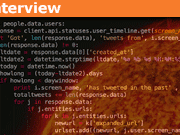Mathematical Preparations For a Physics Major
Full Chapter List - So You Want To Be A Physicist... Series
Part I: Early Physics Education in High schools
Part II: Surviving the First Year of College
Part III: Mathematical Preparations
Part IV: The Life of a Physics Major
Part V: Applying for Graduate School
Part VI: What to Expect from Graduate School Before You Get There
Part VII: The US Graduate School System
Part VIII: Alternative Careers for a Physics Grad
Part VIIIa: Entering Physics Graduate School From Another Major
Part IX: First years of Graduate School from Being a TA to the Graduate Exams
Part X: Choosing a Research area and an advisor
Part XI: Initiating Research Work
Part XII: Research work and The Lab Book
Part XIII: Publishing in a Physics Journal
Part XIV: Oral Presentations
Part XIII: Publishing in a Physics Journal (Addendum)
Part XIV: Oral Presentations – Addendum
Part XV – Writing Your Doctoral Thesis/Desertation
Part XVI – Your Thesis Defense
Part XVII – Getting a Job!
Part XVIII – Postdoctoral Position
Part XIX – Your Curriculum Vitae
Part III: Mathematical Preparations
In most universities in the US, a student must have a declared major by the end of his or her second year. So this is an important transition – committing in a particular area of study. By now, if you have followed the first two chapters of this series, you would have been aware of the necessary background to pursue your academic life in the physical sciences or engineering. All the discussions that we have had so far have been ”generic” to a large variety of fields of study. However, at this point, this discussion will be more specific towards being a physics major.
The end of your second year marks the beginning of more advanced undergraduate physics courses. You will probably no longer be in the same classroom as other majors, and most of your classes will comprise only physics majors. This part of the series will focus on additional preparation you should have to be able to sail through your advanced undergraduate physics courses.
It was alluded to in a previous posting here of having sufficient mathematical background. It has often been said that a physics major sometimes needs more mathematics than even a mathematics major. Mathematics is viewed as a ”tool” that physicists use in describing and analyzing physical phenomena. So one just never knows what tools are needed for which job. This means that a physics major must have a wide-ranging knowledge of different areas of mathematics, from differential equations, linear algebra, integral transforms, vector calculus, special functions, etc. These are the mathematics a physics major will encounter in courses in classical mechanics, electromagnetic fields, and quantum mechanics. Unfortunately, most physics majors do not, nor the time, to be able to take all the necessary mathematics classes. What typically happens is that they learn the mathematics at the same time they are learning the physics. This is an unfortunate way to learn the material because more often than not, mathematics gets in the way of understanding physics. It is hard enough to learn physics, but having to also learn mathematics simultaneously makes the problem rather daunting.
Many physics departments are aware of such problems, and one of the remedies is to offer a course in mathematical physics. This is typically a 1 year, 2-semester course covering a wide range of mathematics that a physics major will need. The purpose of such a course is to give a brief introduction to various areas of mathematics, not from the point of view of rigorous proofs and derivations, but from the point of view of how to use them effectively and correctly, especially when applied to actual physics problems. If there is such a course at your school, I highly recommend that you enroll for it as soon as you can, especially before you need it in your physics classes. That last part, however, can be a problem. I have observed that in many schools, a mathematical physics course tends to be offered late in an undergraduate program, or even as a graduate course. This, of course, does no good for someone wanting to learn mathematics before one needs it. If this is the case, I would strongly suggest that you purchase this text: ”Mathematical Methods in the Physical Science” by Mary Boas (Wiley). I have been recommending (threatening?) this text to several people. This book is meant for someone to start using at the end of the 2nd year and can be used as a self-study. It doesn’t require the mathematical sophistication that other similar books require, such as Arfken. Furthermore, the Students Solution Manual that supplements the text is a valuable book to have since it shows the details of solving a few of the problems. I would recommend getting both books without the slightest hesitation.
Knowledge of computers is almost a ”given” nowadays. However, in physics, this goes a step further. No matter which area of physics you intend to go into, you MUST know (i) how to program and (ii) how to do numerical analysis. The first part is automatic. Most schools require at least a class in computer programming, using a favorite computer language. Most the field of physics, FORTRAN is still in wide usage, C is a language that is gaining in popularity, and C++ is beginning to take hold. I suggest that the minimum number of programming languages you should at least have a working knowledge of is 2: Fortran and C.
The 2nd part of programming, numerical analysis, isn’t as automatic. This is the part most computer science majors do not do, but where most physics, mathematics, and engineering majors, have to do. In many instances, the mathematics that describes a physical system is not solvable analytically. This may be in the form of large matrices, non-linear differential equations, etc. In those cases, one can only find values out of the mathematics by solving them numerically. Learning the mathematics of numerical analysis is an extremely valuable skill for your academic knowledge, and even for your ”marketability” to be employed. Do not be surprised if a few of your courses require a class project involving numerical computing of physical systems. Whether you intend to be an experimentalist or a theorist, you will need to know how to perform numerical computations.
To give students such skills, most schools offer a specific course in computational physics (in some cases, this is a specific area of study in itself at the graduate level). However, sometimes such a course is not offered by the physics department, but rather by either the mathematics department (as a numerical analysis course) or the engineering department. Either way, you need to make sure you get a formal education in one of these, especially if it isn’t part of a required set of classes that you have to take. In the next installment of this series, we will discuss the most important people in your life as a physics major: your adviser, your instructors, and your teaching/laboratory assistants.
Next Chapter: Part IV: The Life of a Physics Major
PhD Physics
Accelerator physics, photocathodes, field-enhancement. tunneling spectroscopy, superconductivity








Looking good in the blog! Such a classic!